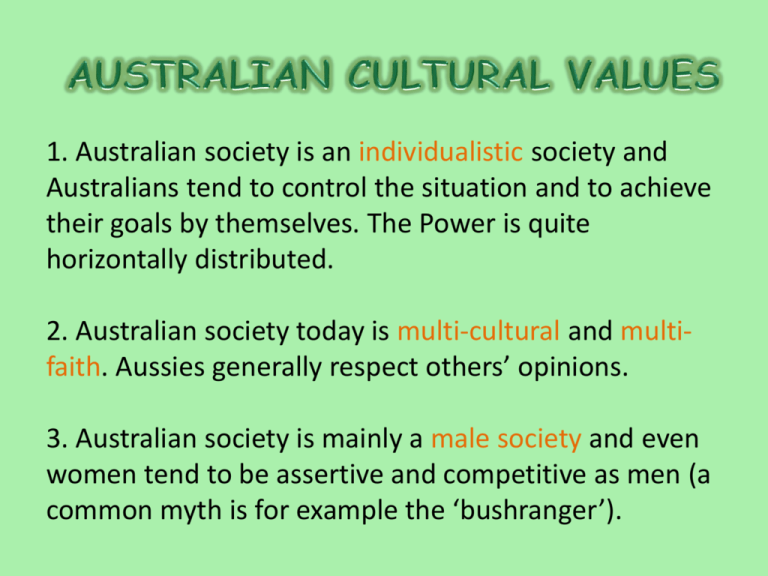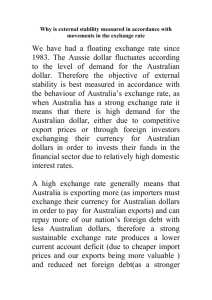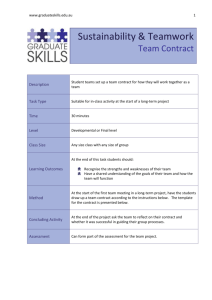1. Australian society is an individualistic society and
advertisement

1. Australian society is an individualistic society and Australians tend to control the situation and to achieve their goals by themselves. The Power is quite horizontally distributed. 2. Australian society today is multi-cultural and multifaith. Aussies generally respect others’ opinions. 3. Australian society is mainly a male society and even women tend to be assertive and competitive as men (a common myth is for example the ‘bushranger’). 4. Australians value modesty, humility and sincerity. They don’t draw attention to their academic achievements, to their status or position or to their success in general. They distrust people who do. 5. Australians give high value to social relationships. They also commonly exchange small gifts between friends and between trades people too. They offer their help to their friends, for example when invited to a barbecue (a habit in Australia). 6. Australians are direct and assertive in the way they communicate. They like brevity. They often use colorful language. 7. Australians like punctuality and don’t like waiting. 8. Australian are informal and casual in greetings and clothing. 9. Australians generally respect nature and are aware of environmental issues. Nature has also an important role in Australian everyday life. Links: See the most important links: http://en.wikipedia.org/wiki/Australia http://www.kwintessential.co.uk/resources/global-etiquette/australia.html http://www.geert-hofstede.com/hofstede_australia.shtml http://fits.depauw.edu/mkfinney/culturaleresumes/australia/WorldView.ht m http://www.youtube.com/ (videos with Cate Blanchett, Megan Gale, common people, ect.). Read and listen to the folk song of Australia “Waltzing Matilda”: http://www.youtube.com/watch?v=6dVZo5a4_Ok & http://en.wikipedia.org/wiki/Waltzing_matilda. Read and listen to the national anthem of Australia “Advance Australia Fair”: http://en.wikipedia.org/wiki/Advance_Australia_Fair#Lyrics (the current version). See the film ‘Australia’, 2008 by Baz Luhrmann, with Nicole Kidman e Hugh Jackman. Part A: phonemic level General Australian pronunciation: the usage of /aː/ (the "long a") as opposed to /æ/ ("short a") of the RP pronunciation in words like ‘graph’, ‘chance’, ‘France’, ‘dance’, ‘demand’, ‘castle’, ‘grasp’, ‘bath’, ‘palm’, ‘start’, ‘bard’, ‘hard’ and ‘contrast’; Other pronunciation differences: - Australia pronounced [əˈstɹæɪljə] instead of [aus.'tra.lja]; - G-day where day is pronounced [‘dai] instead of [‘dei] as in the other words containing the word ‘day’; - I pronounced [a] instead of [‘ai]; -Good pronounced [‘gəd] instead of [‘gʊd]. General Australian is also characterized by a rising intonation at the end of sentences. Part B: morphemic level Most common different spelling: -'program' more common than programme and ‘gaol’ instead of jail Australians also use ‘youse’ as the plural form of the pronoun you adding the suffix –se as in American English: 'how are youse?'. Part C: lexemic level Suffixation with –ie/-y or –o: Australian(s) that became Aussie(s), then cossie for ‘costume’, barbie for ‘barbeque’, arvo for ‘afternoon’, journo for ‘journalist’, muso for ‘musician’, servo for ‘service station’, brekky for ‘breakfast’, bickie or bikky for ‘biscuit’ and so on. Vocabulary: -words which are strictly connected with the Australian history and landscape: •Bush or scrub: any wooded area or from a social and/or political perspective it refers to any populated region outside of the major metropolitan areas; •Bushranger: a criminal outlaw who had the survival skills necessary to use the Australian bush as a refuge to hide from the authorities in the early years of the British settlement of Australia; •mate: a friend; a companion; •paddock: a field in British English; •dinky-di: 'true', ‘genuine’ or ‘devoted’ in expressions like 'dinky-di Aussie' that means ‘true Australian’; - Other useful words: G’day: ‘good day’, a stereotypical Australian greeting (it can be used also at night time); footpath: pavement in British English; weekender: holiday cottage; sheila: girl or woman; lolly: sweet; shanty: pub; broke for: in need of; fed with : tired of. - Vocabulary influenced by Australian aboriginal languages: dingo: wolflike yellowish-brown wild dog of Australia; cooee: as a high-pitched call for attracting attention; yakka: Hard yakka means hard work; didgeridoo: a well-known aboriginal wooden musical instrument dreamtime: in the mythology of most Indigenous Australians, a "golden age" when the first ancestors and living things were created. outback: a sparsely populated area, far from towns; There are also many other many other words which are used differently in Australian English. See http://en.wikipedia.org/wiki/Australian_English_vocabulary and http://en.wiktionary.org/wiki/Appendix:Australian_English_vocabulary for more explanation. Part D: syntactic level •Different usage of : used to - negative form: in AusE usedn’t to against didn’t used to; - interrogative form: in AusE used she to do it? against did she used to do it? •Different usage of prepositions which introduce the object of comparison: - to/from/than: AusE : Cricket is different to baseball. BrE:Cricket is different from baseball. AmE:Cricket is different than baseball. •Different concord with sport team names and uncountable nouns: Aussies use the singular with these nouns which are usually considered plural nouns in BrE: - Ex: North Melbourne is playing well. Part E: textual level The use of ‘as if’ as an exclamatory rejection: - "As if they're real tears!“ - "The case was dismissed? As if." Part F: (normative) pragmatic level -When Aussies meet they use g'day which means ‘good day, hello’ and it’ the typical Aussie greeting. When they leave they say hooroo that means ‘goodbye’. When they thank, they just say ta (‘thank you’, derived from infant speech). Australian use ‘I’m good’ to say ‘I’m fine’. -They also use expressions like carn (which is an assimilation of "come on!" or "Go on!") to invite someone. Australians use expression like ‘Let's go take a gander…’ or ‘Take a squiz at…’ to say ‘to take a look’. - Aussies use also a lot of different way to express surprise and approval as for example: Crikey! (exclamation of surprise); hooly dooley (exclamation of surprise used when something out of the ordinary happens; similar "good heavens", "my goodness", "good grief", etc.); beauty! (exclamation showing approval which is roughly equivalent to ‘Great!’, ‘Fantastic!’ or ‘Wonderful!’); ‘It was the cat's pyjamas/cat's whiskers!’(which means something great or perfectly suited); ‘she's apples/ she'll be apples!’ (that means everything is all right); ‘she'll be right’ (that means it will be okay, it'll turn out all right). - Australians use idiomatic expression as for example: ‘to give it a burl’ that means ‘to try something’ ‘to have a go’; ‘to feel crook’ that means ‘to feel sick’; ‘kangaroos loose in the top paddock’ that’s used to refer to someone considered intellectually inadequate. - Colorful language is very common and is used also to talk about common things as for example: piece of piss: used to refer to an easy task; pig's arse: to say ‘I don't agree with you’; it’pissing down: that means ‘it’s raining heavy’; shits: used in several expressions including ‘shits me’ (or more strongly ‘shits me to tears’) and ‘gives me the shits’ all meaning a combination of ‘annoys me’ and ‘makes me angry’; - When speaking Australian often have false starts as ‘I…I…I mean…’. They also use stock phrases as ‘you know’, ‘yeah’, ‘uhm…’ and so on. Links: http://www.youtube.com/watch?v=KpBYnL5fAXE&feature=PlayList&p=0A3E1F13FA 145720&index=1&playnext=2&playnext_from=PL http://www.youtube.com/watch?v=0EYLMmRCXbs&feature=PlayList&p=0A3E1F13F A145720&index=0&playnext=1 http://www.youtube.com/watch?v=7Rl4rEaAZLM&feature=PlayList&p=A3926C628 DC1C2DE&playnext=1&playnext_from=PL&index=14 http://www.youtube.com/watch?v=dgYJChshyno&NR=1 http://www.abc.net.au/ra/australia/now/default.htm http://www.lycos.com/info/australian-english--general-australian-english.html http://www.doctorconnect.gov.au/internet/otd/publishing.nsf/Content/workAustralian+English http://reese.linguist.de/English/australia.htm http://en.wikipedia.org/wiki/Australian_English http://en.wikipedia.org/wiki/Australian_English_phonology http://en.wikipedia.org/wiki/Australian_English_vocabulary http://en.wiktionary.org/wiki/Appendix:Australian_English_vocabulary http://www.canberratimes.com.au/ http://blacktown.yourguide.com.au/ http://www.theage.com.au/







